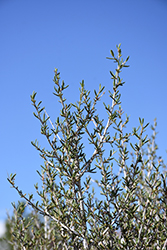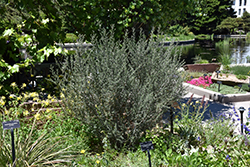Littleleaf Mountain Mahogany Cercocarpus intricatus Height: 6 feet Spread: 5 feet
Sunlight:
Hardiness Zone: 3a Other Names: Narrowleaf Dwarf Mountain Mahogany Brand: Plant Select Description: An evergreen shrub that is great as a rock garden accent plant or screen; an attractive upright plant for dry situations; leathery, needle-like dark green leaves contrast the silvery white bark Ornamental Features Littleleaf Mountain Mahogany features showy yellow tubular flowers along the branches in mid spring, which emerge from distinctive red flower buds. It has attractive dark green evergreen foliage. The small glossy narrow leaves are highly ornamental and remain dark green throughout the winter. The creamy white fruits are carried on plumes from mid summer to early fall. The smooth silver bark is extremely showy and adds significant winter interest. Landscape Attributes Littleleaf Mountain Mahogany is a multi-stemmed evergreen shrub with an upright spreading habit of growth. Its average texture blends into the landscape, but can be balanced by one or two finer or coarser trees or shrubs for an effective composition. This is a relatively low maintenance shrub, and can be pruned at anytime. It is a good choice for attracting birds and bees to your yard. It has no significant negative characteristics. Littleleaf Mountain Mahogany is recommended for the following landscape applications;
Planting & Growing Littleleaf Mountain Mahogany will grow to be about 6 feet tall at maturity, with a spread of 5 feet. It has a low canopy with a typical clearance of 1 foot from the ground, and is suitable for planting under power lines. It grows at a slow rate, and under ideal conditions can be expected to live for 60 years or more. This shrub should only be grown in full sunlight. It prefers dry to average moisture levels with very well-drained soil, and will often die in standing water. It is considered to be drought-tolerant, and thus makes an ideal choice for xeriscaping or the moisture-conserving landscape. This plant is capable of fixing its own nitrogen, which means that it is effectively self-fertilizing. As a result it should not require supplemental fertilizing, and if you do fertilize it, be sure to only use a low-nitrogen fertilizer to promote root growth. It is not particular as to soil pH, but grows best in poor soils, and is able to handle environmental salt. It is somewhat tolerant of urban pollution. This species is native to parts of North America. Characteristics
Applications
Features & Attributes
|

